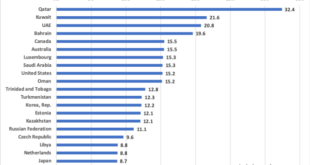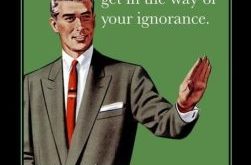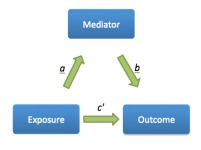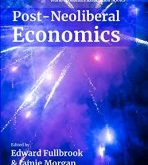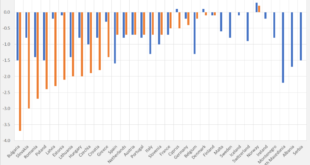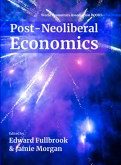The highest CO2 Polluters per capita are dominated by oil producing countries who refine oil and emit CO2 in the oil extraction and refining process.
Read More »University departments of economics are degraded to political propaganda centres.
from Peter Soderbaum Climate change is perhaps the most threatening aspect of the ecological crisis but not the only one. Reduced biological diversity, reduced water availability and deteriorating water quality in some regions exemplify other relevant dimensions. On the financial side, the ‘market mechanism’ has been unable to come up to expectations. How can these problems be understood? Many factors have certainly contributed but in my judgment neoclassical economics as disciplinary...
Read More »Inflation, wages, and profits
from David Ruccio Inflation continues to run hot—and now, finally, the debate about inflation is heating up. On one side of the debate are mainstream economists and lobbyists for big business, the people Lydia DePillis refers to as having a simple mantra: “Supply and demand, Economics 101.” In their view, inflation is caused by supply and demand in the labor market, which is allowing workers’ wages to increase at an unsustainable rate (a story that, as I showed in April, has no validity),...
Read More »Double Double Oil and Trouble. Fire Burn and Economy Bubble!
Join me as I chat with Dean Baker, economist and co-founder of the Center for Economic and Policy Research, all about what is going on with the economy! He gives us the low-down about what is going on in a way that even I can understand and I still call stocks "stonks" based on the internet meme. We dive into inflation, oil prices, the crypto crash, federal interest rates, and so much more. Are we headed towards another recession? Listen to find out! Apologies for the video...
Read More »Mainstream economics — sacrificing realism at the altar of mathematical purity
from Lars Syll This critique goes beyond the narrowly technical — that the workhorse neoclassical model of the economy was found to be lame when it came to running a real crisis race. The deeper critique is that these models, and the technical language that accompanies them, have played a role in policy and in society that has been disproportionate in two senses. First, disproportionate relative to our state of knowledge. Existing economic frameworks have shouldered a policy weight that...
Read More »Causal mediation
from Lars Syll In the real world, it’s my impression that almost all the mediation analyses that people actually fit in the social and medical sciences are misguided: lots of examples where the assumptions aren’t clear and where, in any case, coefficient estimates are hopelessly noisy and where confused people will over-interpret statistical significance … So how to do it? I don’t think traditional path analysis or other multivariate methods of the...
Read More »Getting rents down, converting vacant office space to residential
from Dean Baker There is good reason for believing that the prices of many items that drove inflation higher in the last year have stopped rising and are may even be going in the opposite direction. Used cars are the best example. The CPI index for used vehicles rose 40.5 percent from January 2021 to January 2022. In the three months from January to April, the CPI index has fallen by 4.5 percent. More generally, the supply shortages that drove prices higher in 2021 seem to be replaced by...
Read More »Contextual economics
from Neva Goodwin Starting in the early 1990s I have worked with a number of great colleagues to develop a full alternative that we call contextual economics. The name comes from our conviction that an economic system can only be understood when it is seen to operate within a social/psychological context that includes values, ethics, norms, motivations, culture, politics, institutions, and history; and a biophysical context that includes the natural world as well as the built...
Read More »European life expectancies in times of Covid. A long term story.
Life expectancies in Europe went down in 2019 and 2020 in all countries bar Norway (figure 1). They tended to go down more in countries with a relatively low life expectancy (figure 2) – strong and outspoken tendency. Correlation is not causation. But it can be argued that health and morbidity and life expectancy are influenced by health outcomes during, especially, childhood, including in the in-utero environment (look here, especially 3.1 b and 3.1 c. Look also here). If that’s right...
Read More »The useful economist and economic research
from James Galbraith The useful economist The common characteristic of almost all of this work, excepting a few who preoccupied themselves with logical skirmishes with the neoclassical orthodoxy – e.g., the Cambridge-Cambridge controversies over the theory of capital (Robinson, 1956; Sraffa, 1960; Harcourt, 1972), or in microeconomics (Keen, 2011) – is that the protagonists were concerned, in the first place, with the practical questions of policy facing their governments or the...
Read More » Real-World Economics Review
Real-World Economics Review

